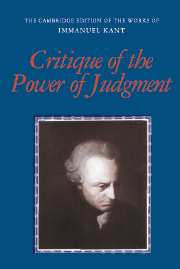Book contents
- Frontmatter
- Contents
- General editors' preface
- Editor's introduction
- First Introduction to the Critique of the Power of Judgment
- Critique of the Power of Judgment
- Preface
- Introduction
- First Part: Critique of the Aesthetic Power of Judgment
- Second Part: Critique of the Teleological Power of Judgment
- Appendix: Methodology of the Teleological Power of Judgment
- Method of citation and abbreviations
- Editorial notes
- Glossary
- Index
Appendix: Methodology of the Teleological Power of Judgment
Published online by Cambridge University Press: 05 April 2013
- Frontmatter
- Contents
- General editors' preface
- Editor's introduction
- First Introduction to the Critique of the Power of Judgment
- Critique of the Power of Judgment
- Preface
- Introduction
- First Part: Critique of the Aesthetic Power of Judgment
- Second Part: Critique of the Teleological Power of Judgment
- Appendix: Methodology of the Teleological Power of Judgment
- Method of citation and abbreviations
- Editorial notes
- Glossary
- Index
Summary
Whether teleology must be treated as part of the doctrine of nature.
Every science must have its determinate position in the encyclopedia of the sciences. If it is a philosophical science, then we must assign it its position in either its theoretical or its practical part, and, if it has its place in the former, we must assign it its place either in the doctrine of nature, insofar as it examines that which can be an object of experience (consequently, in the doctrine of body, the doctrine of the soul, and universal cosmology), or in theology (concerning the original ground of the world as the sum total of all objects of experience).
Now the question arises: Which position does teleology deserve? Does it belong to natural science (properly so called) or to theology? It must be one or the other, because no science can belong to the transition from one to the other, since that signifies only the articulation or organization of the system and not a place within it.
That it does not belong in theology, as one of its parts, even though the most important use of it can be made within theology, is selfevident. For it has as its object natural productions and their cause, and although it refers to the latter as a ground lying outside of and beyond nature (a divine author), it does not do this for the determining power of judgment, but merely for the reflecting power of judgment in the consideration of nature (for the guidance of the judging of the things in the world by means of such an idea, appropriate to the human understanding, as a regulative principle).
- Type
- Chapter
- Information
- Critique of the Power of Judgment , pp. 285 - 346Publisher: Cambridge University PressPrint publication year: 2000

